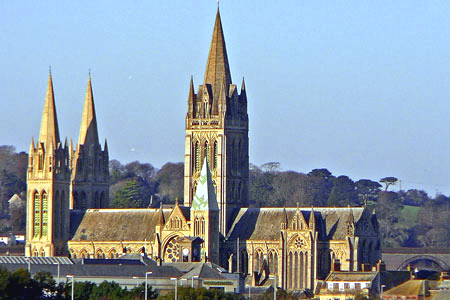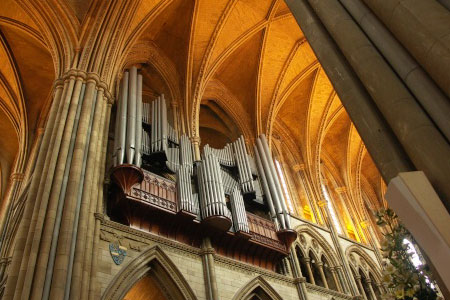| |
 |
 |
 |
| Comment on this report, or find other reports. |
 |
| Our Mystery Worshippers are volunteers who warm church pews for us around the world. If you'd like to become a Mystery Worshipper, start here. |
 |
| Find out how to reproduce this report in your church magazine or website. |
|
|
| 2094: Truro
Cathedral, Truro, Cornwall, England |
 |
 Photo: Tim
Green
Photo: Tim
Green |
 |
Mystery
Worshipper: Deputy Verger.
The church:
Cathedral
Church of the Blessed Virgin Mary, Truro, Cornwall, England.
Denomination:
Church
of England, Diocese
of Truro.
The building:
This is the Gothic revivalist architect John Loughborough Pearson's
masterpiece. Truro Cathedral is all about height and majesty
and vaulted ceilings and perpendicular windows. The Victorian
cathedral contains within its walls part of a Tudor church.
The cathedral is visible from a distance, towering over the
city with its three spires, the tallest of which is currently
covered in scaffolding while a fundraising drive is underway.
The cathedral noticeably curves by six feet to the north, which
was done to accommodate existing neighbours and the shape of
the street on the south side. There is a large and fine collection
of stained glass, mostly by the highly regarded English workshop
of Clayton and Bell, including three rose windows. There are
three organs, including one built for this space in 1887 by
the Liverpool firm of Henry Willis & Sons (whose principal,
often fondly called Father Willis, was a friend of Samuel Wesley).
People who know about such things say that the Father Willis
organ is the best in the land and acoustically perfect. The
ring of eight bells is about to be augmented to become the only
12-bell tower in Cornwall.
The church:
There is a very strong sense of Cornish identity meaning Celtic.
The Cornish saints feature in the cathedral's architecture and
worship. Music holds a very high priority in the life of the
cathedral, given the fantastic organ and a highly acclaimed
choir of men and boys. In fact, the service of Nine Lessons
and Carols had its genesis here in 1880 under the first bishop
of Truro, Edward Benson. The cathedral has a Mothers' Union
group, a Friends group, young people's ministry, lots of artsy
and cultural things going on, a shop, a restaurant, and armies
of volunteers giving tours. I am sure there is much more that
I didn't pick up on. There are at least three services a day.
Sundays begin with morning prayer at 7.30am, followed by holy
communion at 8.00am, a sung eucharist at 10.00am, and evensong
at 4.00pm.
The neighbourhood:
Truro, the most southerly city in England, is an historic market
town dating from Norman times and is the administrative centre
for Cornwall. It has a population of around 20,000. Cornwall
sees hundreds of thousands of tourists in the summer and slims
down to a core community in the colder months. The cathedral
sits at the heart of it, right in the middle of town, surrounded
by shops and restaurants, but is less than a half-hour drive
from the surfing beaches of Newquay.
The cast:
The Revd Canon Perran Gay, precentor, presided, flanked by two
assistants, one of whom was the Revd Philip Lambert, canon missioner,
and the other I presume a curate or deacon but I dont know
his name. The Scottish composer James MacMillan, a lay Dominican,
preached, and his music was used in the service. The director
of music, Christopher Gray, conducted the choir and the assistant
director, Luke Bond, played the organ.
The date & time:
Sunday, 10 October 2010, 10.00am.
What was the name of the
service?
Sung Eucharist.
How full was the building?
Pretty full. There were a few empty seats, but I would guess
there must have been close to 400 people in the nave. I saw
no babies or children at all except the choirboys, and I didn't
see them until later.
Did anyone welcome you
personally?
Yes, there were greeters in the porch and more inside the nave,
ensuring that everyone had the hymn book and service sheet.
Was your pew comfortable?
They were those old wooden church chairs with the book pocket.
Fine, given the sit-stand-kneel nature of the eucharistic service.
How would you describe
the pre-service atmosphere?
When I arrived a few minutes before ten o'clock, the place was
already fairly full. People were talking quietly or praying
or finding a seat.
What were the exact opening
words of the service?
As I approached the cathedral I could hear the bells ringing,
and they sounded lovely. I took a seat, didn't like it, and
moved to another. The bells stopped. There was a silent pause.
The clock struck ten. There was another silent pause. And then
the voice of an angel launched into the introit from somewhere
off in the south side, out of sight. It was James MacMillan's
Christus Vincit and it was incredible. Then the choir
and clergy processed into position. It is possible that the
first words actually spoken were to announce the first hymn,
but I am afraid that by that time I was so enthralled I had
forgotten my mission.
What books did the congregation
use during the service?
The New English Hymnal and a printed service sheet.
What musical instruments
were played?
The wonderful Father Willis organ.
Did anything distract
you?
During communion people returned to their seats and most waited
quietly, praying or whatever. But there was a little gaggle
of gossiping women just in front of me who were quite irritating.
Fortunately, when the priests came down to give communion to
a few people who had not been able to make their way to the
altar, they fell silent, but they had rather broken the spell
of the service.

Photo: David
Long
Was the worship stiff-upper-lip,
happy clappy, or what?
Medium-high. The clergy were vested in seasonal green. There
was a proper sanctus bell that the deacon rang at the elevation
of the elements. There was no incense. The congregation sang
the hymns enthusiastically and well, and maintained respectful
silence for the prayerful and choral parts of the service (except
for the distracting gossips after communion). The eucharist
was celebrated at the high altar, which appears to be the only
altar. It has been pulled away from the east wall, so Canon
Gay got behind it and faced the people.
Exactly how long was the
sermon?
13 minutes.
On a scale of 1-10, how
good was the preacher?
9 – James Macmillan is a Roman Catholic, a lay Dominican,
a musician and composer of note, not a preacher by trade, but
he spoke very well and he was talking about the subject that
is his passion. It was a privilege to hear him (and his music!).
He had been there to deliver a lecture the previous evening,
but sadly I didn't know that. He had, incidentally, composed
some of the music used at services during the recent papal visit.
In a nutshell, what was
the sermon about?
The gospel reading was Luke 17:11-19 (Jesus heals ten lepers,
instructing them to show themselves to the priests). The ten
lepers had to show themselves to the priests because the priest
could authorise their readmission to the society from which
they had been ostracised. But one (a Samaritan, no less) comes
back and gives thanks and praise to Jesus on the surface a
useless thing to do but Jesus lets him know that it was the
right thing to do and wonders why the other nine didn't bother.
The one who gave thanks was more concerned with praising God
than with following the prescribed ritual for readmission. Giving
praise may baffle the contemporary world because it is perceived
to be useless, but when we raise our voices in song it is not
about the consequences. The parting of the Red Sea is the prime
event in the Old Testament and Jewish history, and out of it
comes the Song of Moses. The Song of Songs is the ultimate love
song. Sometimes words are not enough. It is love that moves
us to sing. The psalms were sung in Old Testament times and
the psalter is the original prayer book. Pope Benedict has called
music "the sober inebriation of faith".
Which part of the service
was like being in heaven?
The sublime singing, the marvellous organ, the beautiful building,
the sun streaming through exquisite glass, the combination of
those factors. I understood what it is to be transported by
beautiful church music in a beautiful church.
And which part was like
being in... er... the other place?
It was cold inside the cathedral. Really cold. I realised how
cold when I got outside afterwards and realised it was so much
warmer, although it was mid-October. Also, the reason I moved
from my original seat was because there were some spotlights
on a photo exhibition and one of them was burning my eyeball
where I first sat, so I moved farther back.
What happened when you
hung around after the service looking lost?
Well, nothing. And I tried hard. I smiled at people. I moved
around. I stood still. I stood in the coffee queue long enough
to see what was on offer. I stood and looked at that exhibition
of photos I even made a comment to a man standing there and
he responded, but then he moved away. Eventually, I just left.
How would you describe
the after-service coffee?
It was fair trade instant coffee in a jar, from a supermarke,t
served in paper cups. There was a queue for it but I didn't
try it. I would guess that the tea was also fair trade, but
couldn't see. The biscuits were equally uninspiring. Not the
high point of the morning.
How would you feel about
making this church your regular (where 10 = ecstatic, 0 = terminal)?
10 – If only I could live in Cornwall.
Did the service make you
feel glad to be a Christian?
Yes, absolutely, the service did. Like none other. I think the
lack of welcome at coffee had more to do with there having been
a special preacher and a full house, so that I remained unnoticed.
I am sure if I were to be a regular here, I would soon become
involved. It was a happy, friendly place. I was just an invisible
stranger.
What one thing will you
remember about all this in seven days' time?
Oh... that incredible marriage of sound and light and space
when a boy soloist launched into the introit from somewhere
out of sight and my eyes went up to the heights of this beautiful
perfect building, taking me completely out of myself. |
|
|
 |
 |
 |
| We rely on voluntary donations to stay online. If you're a regular visitor to Ship of Fools, please consider supporting us. |
 |
 |
 |
| The Mystery Pilgrim |
 |
| One of our most seasoned reporters makes the Camino pilgrimage to Santiago de Compostela in Spain. Read here. |
 |
 |
 |
| London churches |
 |
| Read reports from 70 London churches, visited by a small army of Mystery Worshippers on one single Sunday. Read here. |
| |
|
|
|
|


